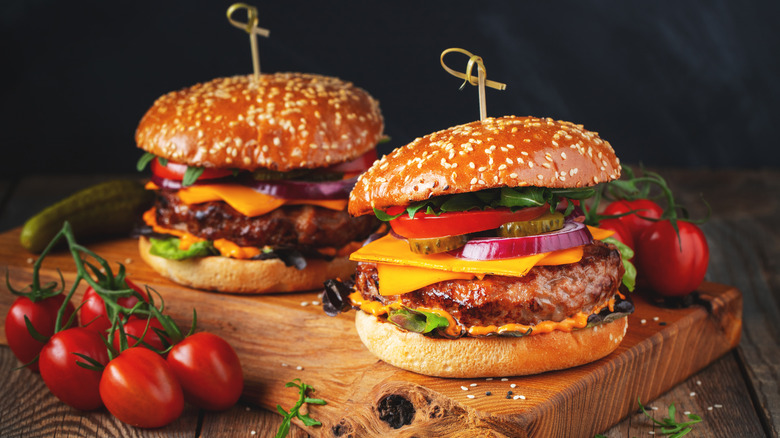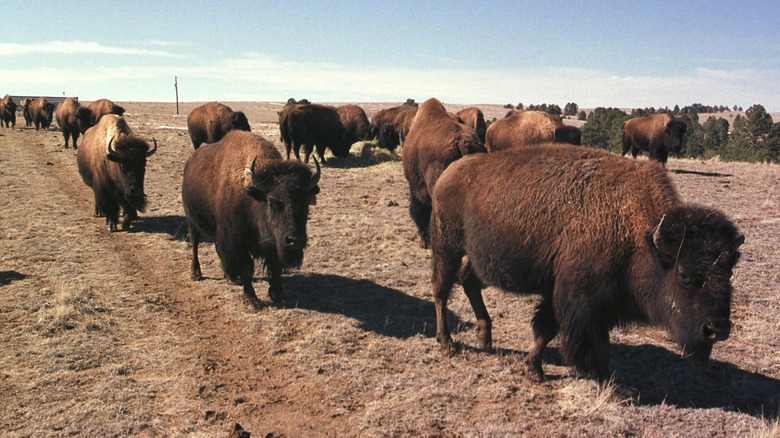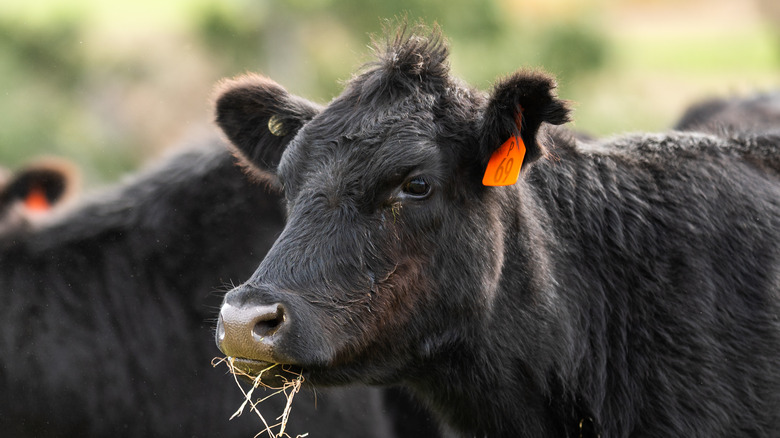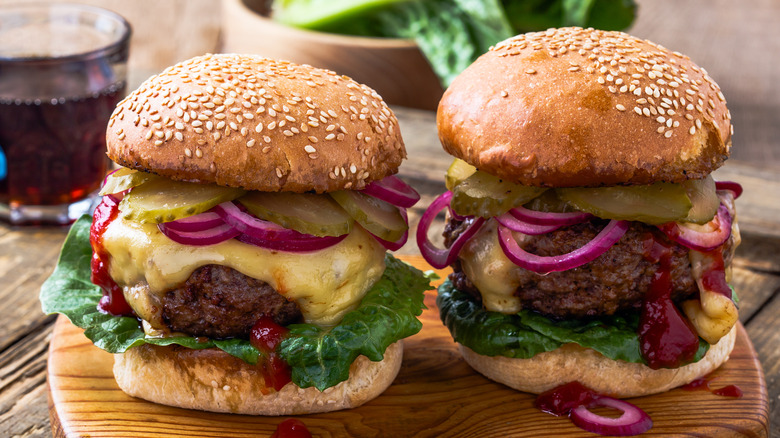Bison Burgers Vs. Beef: Is There A Nutritional Difference?
There is rarely anything more satisfying than biting into a juicy, cheese-slathered, pickle-studded, and ketchup-smeared burger. Even those who forgo meat still make black bean burgers to emulate the nostalgic and self-indulgent experience of a hamburger. Hamburgers got their name from the old German port of Hamburg where locals liked to mince and season up their meat before cooking it. Even though the name is Germanic in origin, the burger was quickly adopted in the United States where livestock was raised in abundance. The hamburger took off in the 20th century as restaurants and fast food chains popularized the food, customizing it and dressing it up to suit their customers' needs (via History).
Today we have cheeseburgers, shrimp burgers, turkey, veggie, beef, and even bison burgers. Now, obviously, there is a huge nutritional difference between veggie burgers and beef burgers, but is there such a noticeable difference between beef and bison burgers?
Where the bison comes from
If you don't know what a bison is, that's okay. Bison meat is no longer as commonly consumed as chicken, beef, or pork, mostly because they were hunted down in mass and now only a fraction of the animals remain. Britannica describes the bison as a hoofed grazing animal that finds itself in the same family as cattle, buffalo, ox, and antelopes. The American bison is native to North America and was an essential aspect of everyday life, spiritual practices, and nutrition for the various native tribes of the Great Plains (via Buffalo Field Campaign).
Today, bison are protected and farmed to make one of America's favorite foods: the burger. According to Bear Mountain Bison, bison burgers are made out of the arm and shoulder section of the livestock called the "chuck." The bison inherently have more chuck because of the large hump between their shoulders. This chuck is usually used for braising, for chili stew, or ground into some delicious burger meat.
Where the beef comes from
If you live in the United States, you know that we take beef very seriously here. According to Statista, the U.S. is the largest producer of beef in the world. In 2021, the North American country was expected to butcher 12.6 million tons of beef and veal alone. The beef industry has come a long way in the past few centuries.
Cattle were only brought over to the Americas as recently as the 15th century, and Ag Daily claims that the first established ranches were not built and sustained until the 18th century. Despite the comparatively short time the New World has had access to cattle, we've managed to make a great profit of slicing cow meat into different cuts of steak, mincing it into raw steak tartare, and of course, grinding it into the juiciest of hamburgers.
Beef is usually harvested from Angus, Hereford, Charolais, and Brahman breeds of cattle (via the U.S. Department of Agriculture). Like the bison, No Spoon Necessary says that beef burgers are made from the chuck, which is often marbled with a fair amount of fat, giving beef steaks that rich flavor and texture.
What is the difference in nutrition?
Both bison and beef burgers are made from the chuck of the cattle and are both considered red meat, so what is the nutritional difference between eating bison and beef burgers? According to Greensbury, eating bison has quite a few benefits. Bison has significant amounts of vitamin B12, selenium, zinc, omega-3 fatty acids, and iron. It is also considered better for your cholesterol than beef.
Healthline claims that beef is also a good source of iron and zinc, but has more fat and calories than traditional bison chuck, which lends to the nutritional value of bison burgers. So, if you are looking to avoid saturated fats and limit your caloric intake you would be advised to eat more bison than beef; however, if you're eating keto and are looking for a fattier source of protein, feel free to chow down on the juiciest beef burger you can find (via Wholesome Yum).
If you do end up cooking up bison meat instead of your normal beef burgers, Eat Right warns that the protein's natural leanness makes it easy to overcook. So when grilling up your patties, remember to keep a closer eye on them than you would your beef burgers, and take them off the heat the second they are finished cooking!



